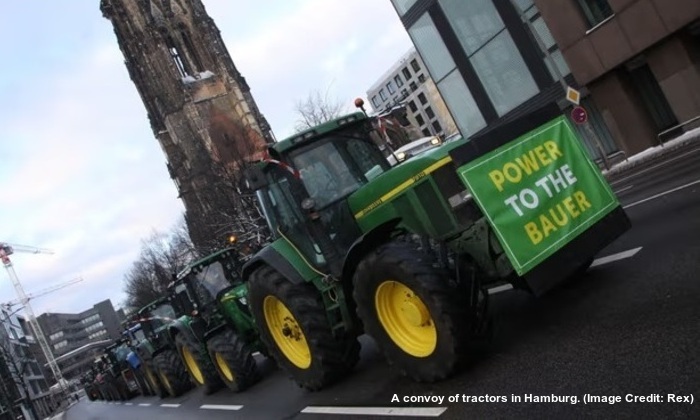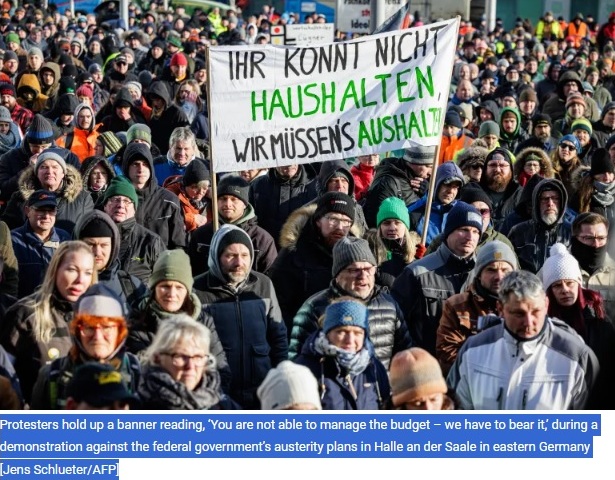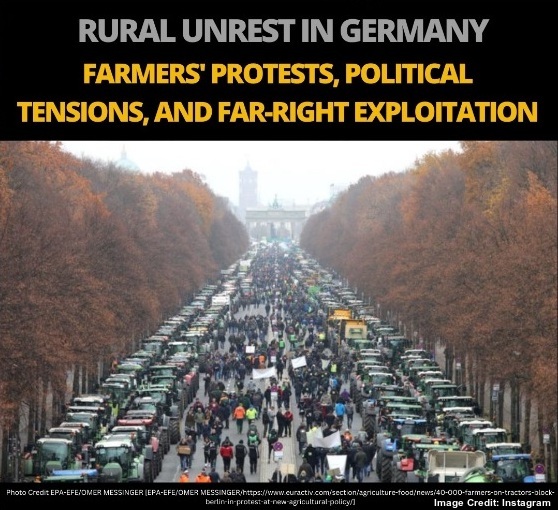Farmers’ Protests In Germany Underline Frustration
Of all the different protest actions in Germany in 2023, the Tractorcades of the farmers in the weeks before Christmas were the most effective, in particular the pattern of road and highway blockades. The ferment in Germany may very well spread to neighbouring countries, both East and West, where the Agricultural Policy imposed by Brussels threatens the existence of quite a number of independent farms.
The campaign in Germany is mainly driven by the farmers’ movement, called Countryside Creates Connection or Land Schafft Verbindung (LSV), which disagrees with the soft approach of the official farmers association. LSV leader Anthony Lee told independent blogger Marc Friedrich on December 27, 2023 that they could not be satisfied by staging new demonstrations and actions only to get invited to yet another discussion with government officials that would lead to nothing. The waves of protests from mid-January are more powerful, as the LSV is cooperating with other social groups to take it beyond strictly agricultural issues. The LSV does not intend to extract just another concession from Berlin, Lee stressed. According to the LSV leader, they want to force the resignation and replacement of the present government, which is pursuing policies that destroy the Western European country, its energy supply system and economy.

The January actions address the recent government decision to cancel the state subsidies to farmers for diesel and to eliminate the tax break for farming vehicles (cf. SAS 51-52/23). However, they have also criticised the European Commission’s (EC) decisions to drastically reduce insecticides and pesticides, demanding a revision of its over-ambitious climate protection policies. The LSV has decided to achieve a historic breakthrough with the upcoming protests. Lee has announced that the plan is not unrealistic, given the opinion polls published recently showing support for the government plunging to 17%.
The activities of the LSV could lead to similar protests in other European countries, such as the Netherlands, where the new farmers’ party BBB has now entered both the Senate and the National Parliament. In Poland and Slovakia, the mobilisation of farmers contributed to election wins for the Opposition parties. Voters expect the new governments to refuse the EC’s decree to make Ukrainian agricultural products duty-free, thereby flooding European markets with grain and other items at prices other countries cannot compete with.

As a result of the duty-free regulation, Ukraine became the third-largest supplier of grain to the European Union (EU) in 2023. The agricultural policy will definitely be an important issue in the election campaign for a new European Parliament (EP) in June 2024. In addition, there is a growing opposition to the continuation of sanctions on Russia that have done more damage to the EU economies than to Russia.
Meanwhile, Talk Diplomacy has reported that Germany’s rural areas became a canvas of discontent as farmers hung makeshift gallows adorned with traffic-light signs, symbolising the three parties in the ruling coalition. This act has marked the beginning of unprecedented protests and strikes across German roads and railways. On January 8, agricultural workers initiated an eight-day nationwide protests, involving motorway blockades, despite the government’s partial reversal of cuts triggering the unrest.

Simultaneously, freight carriers expressed dismay over toll hikes, adding to the wave of protests. Railway workers affiliated with the German Train Drivers’ Union planned nationwide strikes from January 8. While not coordinated, the coinciding protests provide an opportunity for the far-right Alternative für Deutschland (AfD) Party to fuel populist narratives of a coup d’état. The AfD, through social media, depicts ordinary people facing ruin due to an “irresponsible political leadership“, urging citizens to join a “general strike“. The farmers’ association has made an attempt to distance itself from violent fantasies while acknowledging the potential exploitation by the AfD.
The root cause lies in the government’s attempt to navigate a EUR 60 billion funding gap after a constitutional court ruling against its climate and transformation fund. Proposed cuts, particularly to diesel subsidies, triggered populist anger, primarily targeting the Greens. The protests underscore broader farmer frustration over rising bureaucratic burdens and costs. While some support sustainable agriculture, they critique the current approach. The Far-Right‘s attempt to capitalise on protests amplifies political tensions, potentially impacting the upcoming elections. The farmers’ grievances, rooted in economic and regulatory challenges, intersect with broader political dynamics, reflecting an evolving socio-political landscape in Germany.
With inputs from Executive Intelligence Review (EIR) & Talk Diplomacy.
Boundless Ocean of Politics on Facebook
Boundless Ocean of Politics on Twitter
Boundless Ocean of Politics on Linkedin
Contact: kousdas@gmail.com

